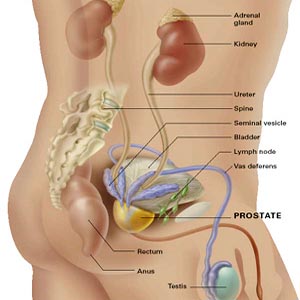Statins could help prevent prostate cancer, other related diseases
 Washington, Apr 27 : Statins, drugs widely prescribed to lower cholesterol, could protect against prostate cancer and other related diseases, according to a new study.
Washington, Apr 27 : Statins, drugs widely prescribed to lower cholesterol, could protect against prostate cancer and other related diseases, according to a new study.
In the large Mayo Clinic cohort study, researchers looked at three different aspects of urological health-prostate cancer, erectile dysfunction and prostate enlargement.
The findings of the study came from data in the Olmsted County Study of Urinary Health Status among Men, a large cohort study of men living in Olmsted County, Minn, which followed 2,447 men ages 40 to 79 from 1990 to the present to assess various urologic outcomes among aging men.
"One of the major advantages of this large cohort study is that the men have participated in this study for over 15 years. Because of this, we have the ability to look at associations between statin use, how long statins were used and multiple aspects of urologic function," said Jennifer St. Sauver, Ph. D., Mayo Clinic epidemiologist and study author.
In the first study, researchers followed the 2,447 men for over 15 years and discovered that men taking statins were less likely to develop prostate cancer, as compared to men who did not take statins.
Out of all the statin users, 38 (6 percent) were diagnosed with prostate cancer, while, non-statin users were three times more likely to develop prostate cancer, suggesting statin use may prevent development of prostate cancer.
Currently, statin medications are used to lower cholesterol or to help prevent heart attack and stroke in high-risk patients.
In the laboratory setting, researchers have observed that statin medications prevent cancer cells from dividing and, may even cause some cancer cells to die.
Although the results are preliminary, researchers claimed that randomized controlled trials are necessary to determine if statins are protective for prostate cancer.
It is known that hyperlipidemia, high cholesterol and other risk factors for heart disease, could put men at risk for erectile dysfunction (ED).
Thus, in the second study the researchers examined 1,480 men from the Olmsted County cohort to determine if men who used statins were less likely to develop erectile dysfunction, compared to men who did not use statins.
It was found that overall, statin use was not significantly associated with a decreased risk of developing ED.
However, statins were associated with a decreased risk of ED among older men (60 years).
Men in this age group who used statins were less likely to develop ED, compared to older men who did not use statins.
Additionally, men who took statins for a longer time were more protected against developing ED.
Usually, benign prostatic enlargement is diagnosed when men visit their physicians due to urinary problems prompted by prostate enlargement.
Researchers have now found that taking statins may prevent or delay benign prostatic enlargement.
Of the 2,447 men studied, 729 (30 percent) were statin users-researchers found that statin users were 63 percent less likely to develop lower urinary tract problems and 57 percent less likely to develop an enlarged prostate.
"Statins have been shown to have anti-inflammatory effects, and previous research suggests inflammation may be associated with benign prostate disease. This study suggests that men''s urinary health could be improved by taking statin medications," said St. Sauver. "."
According to the researchers, further studies, particularly clinical trials, are necessary to determine whether taking statins might prevent development of this common condition.
"If you are taking a statin for a heart condition or to lower cholesterol, these studies suggest that statins could have other benefits. However, it''s very clear we need more information before men are advised to start taking statins for their urological health," said St. Sauver.
The study results were presented at the American Urological Association (AUA) meeting in Chicago. (ANI)